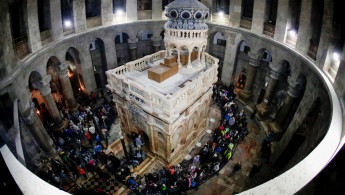Jesus rises: Restored historic shrine reopens in Jerusalem
The ornate shrine surrounding what is believed to be Jesus's tomb was reopened at a ceremony in Jerusalem on Wednesday following months of delicate restoration work funded by Jordan’s King Abdullah, the Palestinian authority and Christian denominations that share custody of the church.
Religious leaders, including Ecumenical Patriarch Bartholomew I, the spiritual leader of the world’s Orthodox Christians, and a representative of Pope Francis, opened the ceremony at the Church of the Holy Sepulchre, built at the site where Christians believe Jesus was crucified and buried.
“If the intervention hadn’t happened now, there is a very great risk that there could have been a collapse,” Bonnie Burnham of the World Monuments Fund, which had oversight of the project, told Associated Press. “This is a complete transformation of the monument.”
They stood in front of the 19th-century Edicule – the most sacred monument in Christianity - surrounding the tomb as hymns were sung.
More than 50 experts from the National Technical University of Athens worked to restore the monument over a period of nine months.
Following the $3.7-million (3.4-million-euro) renovation led by the church's three main Christian denominations, the shrine has been painstakingly restored to its former glory - including a warm reddish-yellow colouring.
The Greek Orthodox, Armenian and Roman Catholic denominations share custody of the church, but disputes between the three have led to renovations being delayed for decades.
The disputes, which on some occasions have resorted to physical violence, have been deeply entrenched, prompting leaders to abdicate the keys to the church to a Muslim family that have held on to them since the 12th century.
Agencies contributed to this report.


